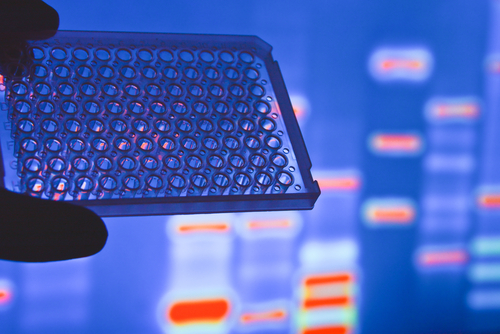Researchers with Juneau Biosciences uncovered genetic markers associated with endometriosis that may help identify women who are more likely to respond to treatment with Lupron Depot.
Endometriosis patients who feel a relief in symptoms with Lupron Depot (leuprolide injections, marketed by AbbVie) carry a higher number of endometriosis-associated genetic variations than non-responders, the data suggests.
The study, “Can Genetic Markers of Endometriosis Predict a Patient’s Responsiveness to Leuprolide Acetate” was presented by Kenneth Ward, MD, chief executive officer of Juneau Biosciences on Oct. 10 at the 74th American Society of Reproductive Medicine (ASRM) Scientific Congress & Expo in Denver. The work was awarded the ASRM “Best in Clinical/Population Science Prize Paper,” according to a press release.
Lupron Depot is a lab-made analog of the natural hormone gonadotropin-releasing hormone (GnRH). The medicine suppresses the release of hormones from the pituitary gland in the brain — the luteinising hormone (LH) and follicle stimulating hormone (FSH) — that control the reproductive cycle and trigger estrogen production in the ovaries. In this way, it works to inhibit the release of hormones that cause endometriosis to grow, AbbVie states.
Lupron is an FDA-approved therapy widely used for endometriosis. However, a significant proportion of women do not respond to the treatment, finding it unhelpful in relieving their symptoms.
Recently, several new genetic variations, or markers, associated with endometriosis were discovered at Juneau Biosciences, a subsidiary of Predictive Technology Group. This company specializes in gene-based diagnostics “committed to assisting women in overcoming the devastating consequences of endometriosis via appropriate early-stage diagnosis and subsequent treatment,” its website states.
Juneau researchers wondered whether some of these genetic markers may predict a women’s responsiveness to leuprolide.
The team conducted a retrospective study that compared the presence of certain genetic markers in 158 women who reported symptom relief with Lupron to those in 177 women who found no benefit.
Specifically, the researchers looked at variations in a group of genes involved in drug metabolization (processing) by the body, referred to as the P450 cytochrome genes.
Results showed that women who responded to Lupron carried a higher load of genetic variations in these genes (a higher genetic “score”) than women who did not respond to the therapy.
DNA variants associated with endometriosis were present in almost every patient studied, the researchers wrote. These variants, they said, are likely to contribute to the clinical heterogeneity (diverse presentations) of endometriosis.
“Women who responded to LA therapy were likely to carry a higher burden of gene variants than non-responders. Work is underway to pinpoint the subset of DNA markers with greatest effect and to understand the biology of their association with LA responses,” the team concluded.
At the ASRM conference, Juneau researchers also presented their discoveries on endometriosis genetic markers, found using the Predictive’s Genealogy Database (GenDB).
“Predictive is using its powerful GenDB database to increase the efficiency and thoroughness of gene discoveries in complex diseases,” Bradley Robinson, chief executive officer of Predictive Technology Group, said in the release.
Using this database, they identified families with the largest presence of genes linked to endometriosis reported to date.
One family tree spans 19 generations and includes more than 250 women with endometriosis, all descendants of a man born in 1608. Data from GenDB also suggests that over one million women in the U.S. may carry this family’s genetic risk factor.

